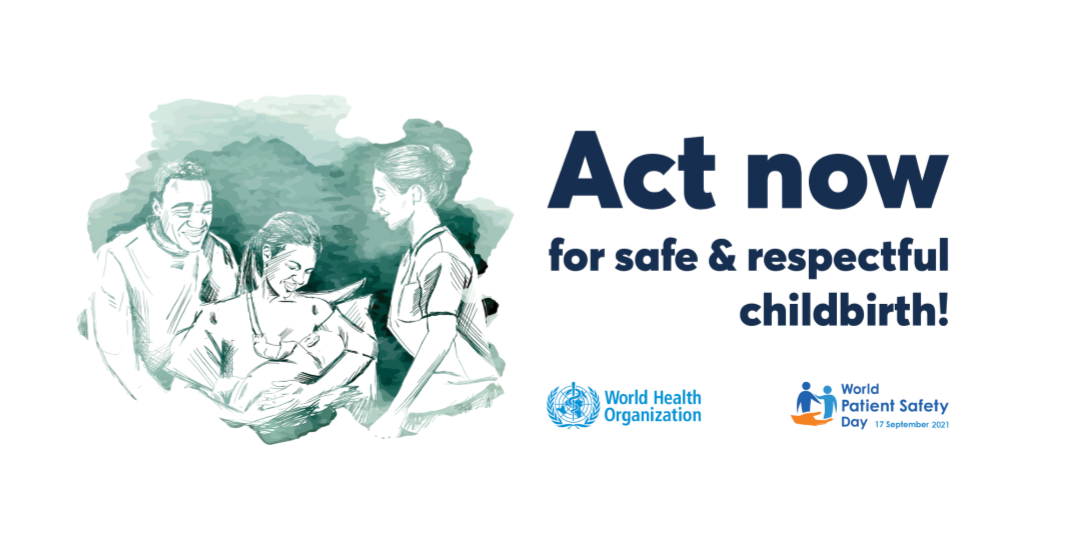World Patient Safety Day, held every year on 17 September, calls for global solidarity and concerted action by all countries and international partners to improve patient safety.
World Patient Safety Day 2021 is dedicated to the need to prioritize and address safety in maternal and newborn care, particularly around the time of childbirth, when most harm occurs.
Every day, approximately 5,400 stillbirths occur, 810 women lose their lives and 6,700 newborns lose their lives. 94% of all maternal deaths occur in low and lower-middle-income countries, and most could be prevented.
In partnership with our colleagues at the WHO, WFSA calls on:
- Policy-makers and programme managers – Prioritise safety in maternal newborn services to help build safer health care systems.
- Global health workers – Build your competencies through continued medical education to provide safe and respectful maternal and newborn care.
Anaesthesiologists play a vital role in providing total care for mothers and babies by administering comfortable, safe, and pain-free anaesthesia. Our goal includes providing up-to-date, evidence-based information, pain relief options, and recommendations for the entire perioperative period. We want every new mother to feel safe, know that her decisions are respected, understand and accept the anaesthetic plan, and have the best labour and delivery experience we can provide.
The birth of a child is one of the most meaningful experiences of a woman’s life. We aim to maintain wakefulness, allowing mother and baby to bond skin-to-skin as soon as possible so that the birth experience can remain unique, tender, and family-centered.
A collaborative approach with other maternal care professionals ensures that we provide the best care for both mother and baby.
Dr Erlinda C .Oracion, MD, MBAH, Chair of the WFSA Quality and Safety of Practice Committee
Improved anaesthesia – improved patient safety
Five billion people lack access to essential anaesthesia care, this figure includes two billion children.
Neonatal mortality is inextricably linked to maternal health. The Sustainable Development Goal’s (SDGs) target of reducing neonatal mortality to 12 deaths per 1,000 live births requires increasing timely access to caesarean section, together with high-quality neonatal care.
Achieving the SDGs target of reducing maternal deaths to fewer than 70 per 100,000 live births requires investment in anaesthesia, obstetric and surgical services. Access to Comprehensive Emergency Obstetric and Newborn Care is essential. Obstetric and anaesthesia services must be coordinated to address preventable mortality, as unsafe anaesthesia contributes to 14% cent of deaths after caesarean section.
Health workers’ Continued Medical Education
Providing opportunities for anaesthesia professionals to improve their skills and competencies through continued medical education is a vital component of efforts to establish a health workforce able to provide mothers and children with the medical care they need.
WFSA’s clinician-led programmes provide essential information and training to improve the knowledge and competencies of anaesthesia professionals.
- Anaesthesia Tutorial of the Week – The ATOTW library contains over 60 obstetric and paediatric anaesthesia tutorials focusing on maternal and newborn health care with issues ranging from analgesia for labour through to resuscitation of the newborn.
- Update in Anaesthesia – Over 20 articles, including Vol 34: An obstetric anaesthesia special, cover a wide range of maternal and newborn subject areas.
- SAFE Obstetrics courses – Over 5,000 clinicians in 43 countries have taken part in this three-day course aimed at anaesthesia professionals in low resource settings. The course addresses the core and extended roles of the anaesthetist in obstetric emergencies, focusing on clinical scenarios that cause 80% of maternal deaths.
Prioritizing safety in maternal and newborn services
Alongside WFSA’s work with partners at the WHO, WFSA has been working with UN member states at the Human Rights Council to firmly embed anaesthesia within the human rights discourse and make the case for greater investment in and priority for anaesthesia and surgical care and services.

Calls to strengthen maternal and reproductive health care services through the training of health care workers was included in the 2021 HRC resolution on Preventable Maternal Morbidity and Mortality. This is the first time the vital role of anaesthesiologists has been included in an HRC resolution.






